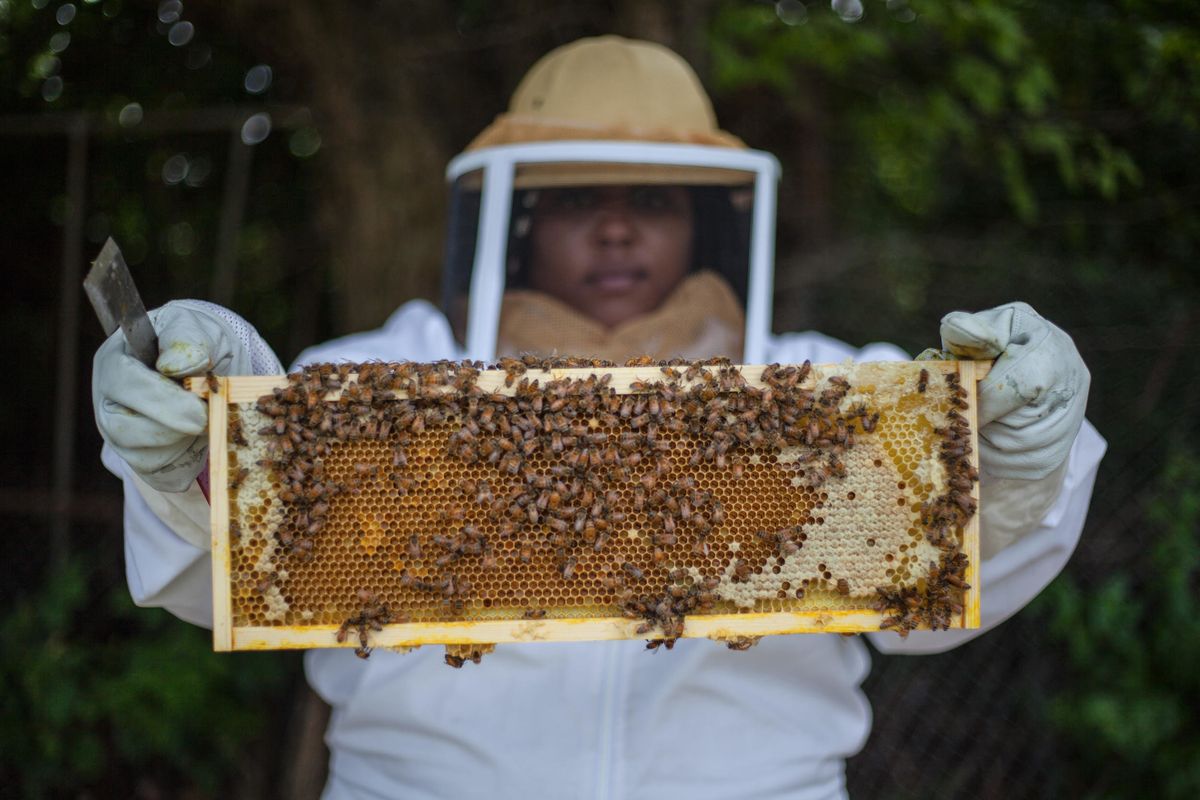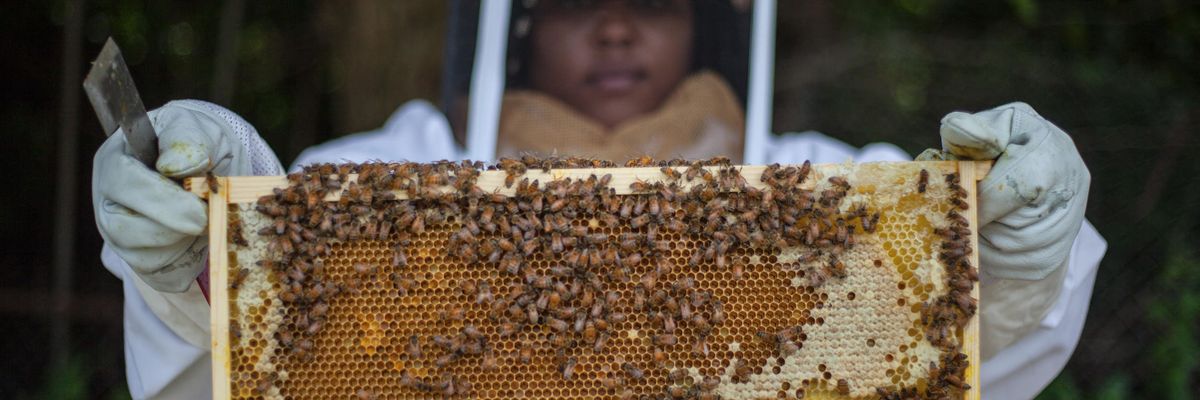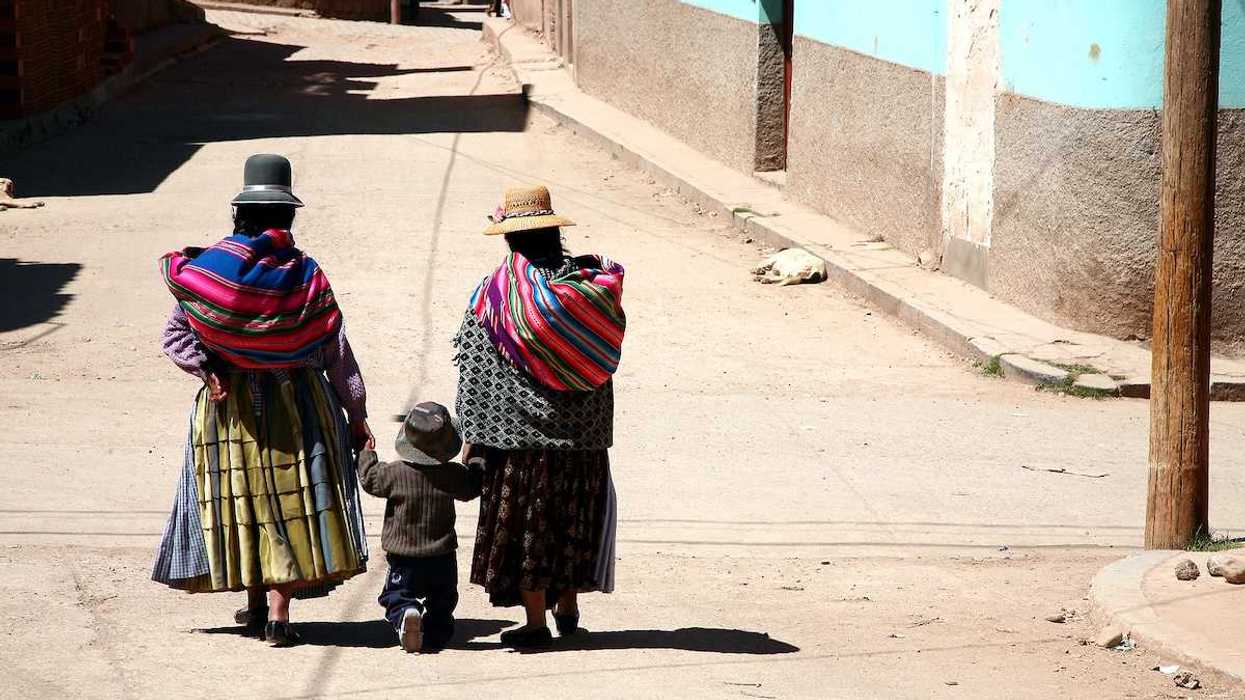DETROIT — Timothy Paule Jackson's affinity for bees began in 2016.
In the midst of a bad cold, he discovered "the power of raw honey" and became infatuated.
Jackson, formerly a self-employed entrepreneur in commercial photography and advertising, and his partner, Nicole Lindsey — both 35-year-old lifetime Detroiters — saw opportunity in Detroit's tens of thousands of vacant lots.
"We were born and raised in Detroit … so we see (vacant lots) everywhere we go," Jackson told EHN.
The couple made a pitch to a local micro-crowdfunding campaign, earning $1,600 that led to the purchase of a land plot and three beehives in 2017—and thus began Detroit Hives.
And they're not alone—across Detroit, unused space is being used for urban gardening, farms and, increasingly, bees. As bees decline around the world, urban entrepreneurs like Jackson are trying to fill the void. Detroit Hives is one of the city's two major beekeeping nonprofits, combining to operate nearly 200 hives in the metro area.

Honeybees surround a frame of capped honey that they created and stored. (Credit: Bees in the D)
Data is sparse on urban keeping, however, The Honey Bee Conservancy, which has sanctuaries across the U.S. in large cities like New York City, Seattle, Miami and in states like Iowa and Kentucky, estimates its efforts have resulted in the raising of 10 million bees in 44 states.
Honeybees remain "the most economically valuable pollinators of crop monocultures worldwide," said The Royal Society in a 2006 article.
However, bees have experienced rapid declines nationally and worldwide. For the majority of the past decade, beekeepers, primarily in the United States and Europe, have reported hive losses of 30 percent or higher. In addition, one in four wild bees in the U.S. is now at risk for extinction.
Scientists are still trying to tease out the exact causes, however, they've pointed to diseases, parasites, habitat fragmentation, pesticides, colony collapse disorder, climate change and a combination of all these. And the losses are concerning as about a third of our food relies on pollinators (honey bees are one of many species that pollinate).
As the bees suffer, city residents are building sustainable operations that invest in conservation, education and economic development.
"I really think it's all about the education and the importance of pollinators, how it's so important to our food systems—especially in Detroit, one of the most insecure food cities," Jackson said.
Giving back for the bees

A honeybee sits on the finger of Brian Peterson, founder of the nonprofit Bees in the D. (Credit: Bees in the D)
A trip to Beaver Island, the largest island in Lake Michigan, home to the Mormon Church in the 1850s before later being settled by Irish Americans and turning into a popular tourist destination—changed Brian Peterson's life.
Peterson, the founder of Bees in the D, is a fifth-grade teacher in suburban Detroit and an adjunct professor at Oakland University, teaching scientific concepts as part of a course titled "Science for Elementary Teachers."
"The bees were really there for me when I needed something," he told EHN. He was invited to the island by a fellow Oakland University professor who had an apiary.
When he met his husband, also named Brian, bee decline was making headlines. In the summer of 2014 they decided to start rooftop beekeeping in Detroit.
The pair started six hives: four in Detroit and two in Lake Orion, a suburb of Detroit. That included honeybee hives on the roof of TCF Center, historically known as Cobo Center—a convention center nationally renowned for annually hosting the North American International Auto Show. The rooftop provides serene views of the Detroit skyline, as well as Windsor, Canada, along the Detroit riverfront.
"In our first year we were on our hands and knees begging people to give us a chance," he said. "Cobo came on board. All the sudden it was a runaway train."

A hive tool is used to scrape off capped honey for sampling. (Credit: Bees in the D)
The next summer, there were 29 hives. The increase was gradual, leading to 160 hives at 52 separate locations across five major counties in Michigan—including 71 hives in Detroit proper.
"It's really thrown me into the world of urban beekeeping," Peterson said. "It's a full-time job. My payment is knowing that I try to make a difference."
There are now 10 employees, along with about 100 volunteers.
Tending to hives "comes in waves," Peterson said, depending on the season. Currently, labor comes in the form of winterizing hives. In the spring, they're doing hive maintenance and in the summer, they're both checking hives to make sure things are going well and using harvests to educate and organize metro area residents by way of workshops and events.
And the stings? "When you're dealing with 8 million bees, to be stung a couple times here or there is really not that much at all," he joked.
Bees in the D sells honey in a few metro Detroit locations. Results vary annually because some bees are more productive than others. Dry seasons lead to less production.
Honey is used in myriad ways. The organization paired with a local Detroit distiller to create a honey bourbon concoction. It partnered with a craft brewery for a special beer. Honey also goes into lip balms and candles.
Money made mostly goes back into the organization, for more hives and an effort to open a Detroit-based education center.
Opportunity in vacancy

A vacant lot in Highland Park that current sits unowned exhibits how insects and pollinators alike can benefit. (Credit: Detroit Hives)
Kameshwari Pothukuchi, a distinguished professor of urban planning at Wayne State University in Detroit, said the city has reduced its number of vacant lots, from close to 100,000 around 2014 to between 60,000-70,000 lots today.
"Abandonment has taken place over many decades," she said. "Detroiters, who have stayed behind or were left behind, have had to deal with the vacancies."
Pothukuchi said the city presents opportunity to beekeepers because of this urban wilderness, especially since cities don't have as much pesticide spray as do farm lands.

Plants called Sedum sit atop the TCF Center roof, with the Ambassador Bridge seen in the background. (Credit: Bees in the D)
"Bees have been dying off, in all kinds of habitats," she said. "Some of that was sporadic, due to massive cold events. We know that in agricultural locations, massive die offs have been related to mite infestation. There's also been a lot of evidence that pesticides…have been a massive cause of bee die offs."
Peterson agrees. He believes Detroit is "primed" to become an urban beekeeping leader.
"There are a lot of weeds, and weeds are flowers, and that's beneficial to the bees," Peterson said. "The nice thing is, (in Detroit) they're not being sprayed and people aren't putting fertilizer on it, and they're not using pesticides. They're not harming pollinators."
Currently, Detroit does not have a beekeeping ordinance. There are some statewide regulations and inspections, but municipalities mostly get the final say. There are no mandatory hive inspections, nor are there apiary registration requirements. Pothukuchi said Detroit is currently deliberating on a beekeeping ordinance, but nothing is "yet on the horizon."
Cities that encourage beekeeping should continue to do so, Pothukuchi said, adding that ordinances should be adopted to better understand the benefits.
"This is wild nature," she said. "You can't restrict bees from your city boundaries, but if you actively keep bees, there needs to be some standards that need to be upheld. You can do that in urban settings; you just need to be mindful of how to do it."
'A sense of purpose'

Lindsey and her partner and Detroit Hives co-founder Timothy Paule Jackson pose with their 2019 Keep Michigan Beautiful President's Award. (Credit: Detroit Hives)
Jackson said Detroit Hives has rapidly grown over the past two years— the nonprofit now has four full-time employees, one grant writer on a contract basis, and lots of volunteers. They manage 35 beehives at five locations.
From those 35 hives, they have produced more than 300 pounds of honey. Moving forward, they anticipate 50-100 pounds of honey per hive. If some hives produce a scarce amount of honey, they leave it behind for bees to feed during the winter. "The bees get first dibs," Jackson said, adding that 60-80 pounds of honey are reserved for overwintering bees.
Other uses for the honey include tasting events, as well as partnering with local businesses to create a barbecue sauce. The focus is not on selling or profit margins, though. Jackson said the two main goals are helping the environment and the community.
Education was admittedly not the first endeavor. But then local schools, from elementary to universities, showed up at their door wanting to know more about the bees.
"We said 'yes' to the universe and did something in our lives we never did before," Jackson said. "Who else, from our community and background, can talk to our community and talk to our children like we can?" He estimates they've educated more than 2,000 local students.

Lindsey stands with Marlon McDowell and his daughter, left, and Edward Williams with his two children. They are all Detroit residents. (Credit: Detroit Hives)
The organization practices natural beekeeping, which it defines as abstaining from the use of chemicals and human-produced materials, like plastics. They work with universities—including Wayne State University, University of Michigan and University of Detroit Mercy—to conduct research on food security, green infrastructure like tree plantings and pollinator-friendly native plants, and keeping track of pollinator habits within city limits.
Jackson believes the time is now to change the ecosystem. Michigan is home to 450 types of native bees. Avoiding pesticides and herbicides positively affects soil, air, water and plants. Planting native wildflowers helps, too.
"We must do away with the mindset where weeds are wildflowers," he said. "We must understand these are food sources, not just for us but for all insect life."
Authenticity counts. So does being a voice and inspiring a new generation of leaders.
"What we don't want to do is put all our hard work and efforts and say, in 1,000 years we're not around and nothing happens … It gives us a new sense of purpose," he said. "It gives us ownership. We just wanted to take a vacant lot and do something cool and bring a community together. It morphed into this."
















